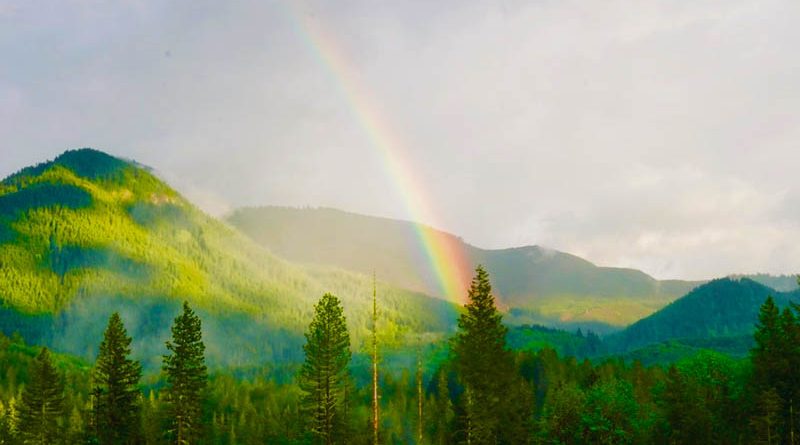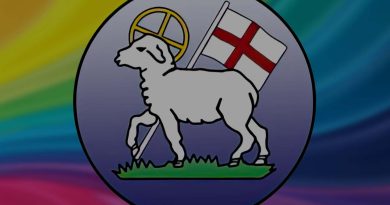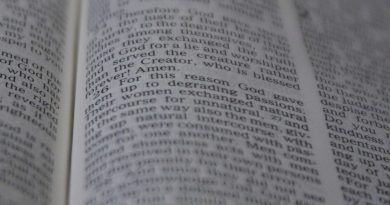Valley of Hope
by Dana Myers
The Other F-Word
The first time I heard the word “faggot” was at church camp.
“Her brother is one,” a pretty blond haired 4th grader whispered into the dark. They thought I was asleep.
Giggles ensued, obviously precipitated by the taboo vocabulary word that I didn’t know. Huddled in my red sleeping bag against the cabin wall on the top bunk, I tried to scroll through every word I had ever heard to identify what about this specific one would make a cabin full of eager 4th grade fundamentalists giggle uncontrollably.
I knew “f” words were profanity and assumed this one was somehow connected to the other dark “f” word that the same girls whispered into the dark late at night at church camp, giggling with childlike zeal.
I came up empty.
Trying to settle down to sleep that night in the sticky North Carolina summer, tears rolled down my cheeks as I recognized the stark truth that even a sheltered, Christian-school-educated 4th grader could understand.
Whatever a “faggot” was, it was bad.
Losing Hope
The best day of my life was learning that my brother Mitchell Allen, who died from complications due to HIV/AIDS on June 21, 2010, was not, in fact, spending eternity in hell.
Mitch was 37 when he died. He loved Star Trek. He went to church most Sundays. He was a writer. And he was gay.
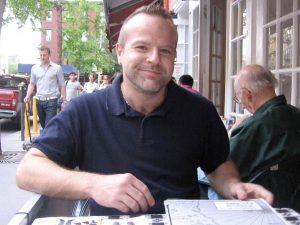 When he came out as gay to our evangelical, fundamentalist church in the late 1980s, I was too young to understand what was happening. Forsyth Hospital’s psychiatric ward- suicide attempts – “Christian counseling” intended to help him change his sexuality – all of these were far above the comprehension of a little blond 10 year old who loved Thundercats and adored her funny, sweet, gregarious big brother.
When he came out as gay to our evangelical, fundamentalist church in the late 1980s, I was too young to understand what was happening. Forsyth Hospital’s psychiatric ward- suicide attempts – “Christian counseling” intended to help him change his sexuality – all of these were far above the comprehension of a little blond 10 year old who loved Thundercats and adored her funny, sweet, gregarious big brother.
When he contracted HIV in the late 90’s, I was taught in Christian school that this terrible disease was punishment for the sin of being homosexual. I went to nursing classes at night and learned how to inject my funny, sweet, gregarious big brother with vials of Interferon and other antiviral drugs meant to stop the progression of the disease that God had sent to punish his terrible sin. He contracted Hepatitis and experienced AIDs-related dementia, gum necrosis and degenerative disc disease in his upper back and neck, all collaborators with the underlying HIV infection bent on punishing his “alternative lifestyle.”
“God still loves me, Honeybun,” he would assert, contradicting everything I had learned about gay people from school and church, “and I love God. Jesus hung out with queer people, you know.”
Yet the nagging voice of dissent persisted. He was “living in sin,” the voice said, even though Mitch didn’t have a regular boyfriend or significant other and because of the illnesses that ravaged his ever-thinning body.
Even the word “queer” sounded sinful, a label for a whole realm of disrespectability that, in my mind, included everything from leather-clad men to feather-boa-toting drag queens.
So I prayed.
“God, if you can’t make him straight, at least heal him.”
“God I know that Mitch is a sinner – but so am I – please, please, please don’t take him away.”
“Help him to realize how much you love him as he truly is – not this abomination that he thinks himself to be.”
Prayer after prayer.
And I read, book after book on Christianity and homosexuality. How to respond “in love” to your gay relative. How to pray for your gay relative. Bible passages to share with your gay relative.
Then he died.
On a mundane Monday night, in a New York City apartment that he shared with a gay couple that knew the love of God enough to welcome into their home a dying man from North Carolina, God held my funny, sweet, gregarious brother’s hand as he was ushered from this life into the next.
Not hell.
Although my pastors and Christian friends assured me that God wouldn’t punish someone who truly had accepted Jesus as their Lord and Savior, there were always the modifiers.
What if my brother had not “truly” accepted Jesus?
For years I wondered. Dreams carried me back to our mother’s living room sofa, Mitchell alive and well and our family laughing together on his birthday. Yet I would wake up and still wonder where he really was.
He seemed so far away.
Words of Holy Scripture – “I go to prepare a place for you…” and “even though I walk through the valley of the shadow…” helped but nothing truly soothed the wonder and worry of how a lifetime of Biblical “knowledge” on sexuality had cemented in my mind one “true” fact.
Mitch was in hell.
And I would never see him again.
Finding Grace
Five years following Mitch’s death, I was tired of wondering and doubting God’s faithfulness. Each time I “made up my mind” about what happened to an HIV+ gay man after he died, I’d read some phrase in the Bible or hear a sermon, or just get a feeling that contradicted what I had so firmly determined.
My brother was in hell. Only he wasn’t.
God loved everybody.
But people could “choose” to deny him, could refuse their ticket into heaven, could opt out of heavenly blessings.
And surely gay people did just that, refusing to honor God every time they chose to have gay sex. Or was it every time they chose to go on a gay date?
Or was it every time they were attracted to someone of the same gender — or chose to be attracted to someone of the same gender?
Wait! “Hang on a minute,” my mind said.
When exactly did being gay become a sin? When did it get you condemned to hell?
Christian school and Sunday school taught me that we are all sinners, born into a legacy and inheritance of sin that there is no way we can avoid. This “sin nature” curses us to an eternity spent apart from God, if we continually refuse Christ. But have hope, said my teachers, because Christ died on our behalf, so that he could take on himself the whole penalty and obligation of our “sin,” that inherent state of being for which we had no control.
Gay people, too, fell under this system of sin and forgiveness. If the “homosexual” would repent of his sin, turn from his evil ways and seek God’s forgiveness, he would also be “saved” from eternal damnation. God’s forgiveness was once-for-all, good for past sins, present ones and future transgressions. But not, apparently, for sins of a certain “lifestyle.”
Again, these ideas ran round and round in my mind.
If we were all born into sin, what made the sin of homosexuality worse than all the others?
And that burning question – when exactly did being gay become wrong?
I knew that my brother didn’t have a boyfriend until high school. Was it then that his “sin” became wrong? Was it his sophomore year that this “sin” became enough to be called a “lifestyle”?
Yet I also read of other gay men who knew at a very young age – some as early as elementary school – that they were different to other boys, fascinated by masculinity and dreaming of weddings and families (as all children do) with other men holding their hands and repeating vows in the church. I read biological textbooks and psychological studies that both vehemently declared, along with the American Psychiatric Association, that gender and sexuality were not chosen but rather inborn, infused into a person’s DNA in the same way that hair and eye color were predetermined.
How could it be a “sin” to have blue eyes or brown hair?
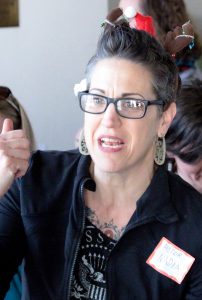 Into all these questions, textbooks, online articles and documentaries stepped a figure that would change my life forever: Pastor Nadia Bolz Weber.
Into all these questions, textbooks, online articles and documentaries stepped a figure that would change my life forever: Pastor Nadia Bolz Weber.
Known as the “tattooed pastor,” Nadia was speaking at an event called Why I Am Still a Christian in early 2016. A friend who knew I had read her books sent me a link via email to reserve free tickets.
Nadia’s talk was everything I dreamed I would find in the Church. She affirmed the universality of humanity, speaking of each of us as Beloved by God.
“Even your gay brother,” the Holy Spirit whispered in my ear.
It would stand to reason, said the Spirit through Nadia, that if one’s “sin” is no more inborn than anyone else’s “sin,” if certain “sins” were based on the biology of who humans were as people in their DNA, if “sin” could not be quantified has having a starting point and an ending point, then God must look to something other than “sin” to determine eternal destiny.
Not many days after attending that transformational talk in 2016 that helped me to affirm once and for all that I was in fact a Christian (and one who believed gay people were definitely in heaven), a spiritual leader showed up on my doorstep to inform me that I was being removed from all positions of leadership within my church. I was no longer a ministry leader. My family and I (she suggested) might be best served to look for another church in which to worship.
It felt like having hope in my brother’s eternal destiny brought despair in the faith practice and tradition in which I was raised. I had never preached or taught any of the ideas I was exploring in my spiritual life. I had barely whispered them to my closest friends. Yet the photo on social media of myself with Nadia was enough to seal the deal. Gay people (and those who supported them, loved them, or gasp! entrusted them to God’s grace) were out.
It was almost a year before I could bring myself to return to any faith or religious setting. Yet the Spirit remained steadfast within me and reminded me that this was not my journey to walk alone.
So, haltingly, fearfully and with many second thoughts, my family and I walked into a Moravian church for the first time.
It was there that I learned of love-informed theology, of justice and orthopraxy (the practice of faith rather than merely “right belief”). It was there that I first got to tell Mitch’s story from my perspective – not in hushed tones, not by avoiding the parts that I loved most about him (his creativity, humor and gentle nature) that might have tipped off the listener that my brother was in fact, gay, — but to tell his story from the perspective of a sister who loved her big brother more than anything and only wanted to have assurance that God loved him just as much.
It was in the Church that I found hope for a future informed by faith, love and hope, not judgment, condemnation and uncertainty. One local congregation was even hosting a book study of Nadia’s latest book, Accidental Saints. When I asked Bishop Graham Rights in our theological education classes if the Moravians believed a gay man could go to heaven, he didn’t answer my question immediately. Instead, he wanted to hear all about Mitchell. As I told him of our family’s history in church, of the conversion therapies, the suicide attempts and how many times Mitch had tried to convert to straight, I wondered if I would be able to accept his answer on the matter if it was anything less than the Grace I so desperately needed to find. Not only Bishop Rights, but every Moravian I met and with whom I shared our story helped me to rest in the assurance of God’s love and grace for all of God’s creation. When Mitch’s birthday came around that year and I wore an AIDS awareness ribbon to honor his life, others suggested we should honor World AIDS Day as a church and do more to serve the LGBTQIA community.
It wasn’t just the knowledge that God shared love and grace with all of humankind that helped me to rest in the theology of the Moravian Church as an authoritative voice. It was their reason, experience, Scriptural foundation and rich church history that all came alongside the theological framework of Grace extended to everyone. It was all the things I had been taught to look for in school to find true doctrine. It would become all the things I am being taught in Seminary that are marks of true and right belief.
But belief wasn’t enough. It was the faith practice of these people that gave me hope in the darkest experience of my life. It was their insistence to love first (and leave off the quantifiers and questions) that helped me to see the face of God upon every face I began to encounter, both inside the church and in the world.
There were still times I thought back to the “f” word I heard at camp on that sticky summer night in the mid-1990s. Learning of a non-affirming organization within this church tradition that had so beautifully and openly welcomed me and my gay siblings in Christ caused some old trauma to be loosened in my heart. I understood why they felt the way they did about gay people because I had once agreed with them. I had once prayed the same prayers. I had once hoped for the same “healing” of the gayness of those they loved. I had once “loved the sinner and hated the sin.”
Yet in the darkest place I could experience – the true valley of the shadow of death – when hope was extinguished by doubt and uncertainty – I found the comfort of the Savior.
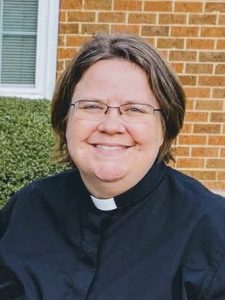 He was there all along, holding my brother’s hand.
He was there all along, holding my brother’s hand.
Dana Myers is a candidate for ordination in the Moravian Church. She is studying at Luther Seminary, and serves as student intern at Fries Memorial Moravian Church in Winston-Salem.
PHOTO CREDITS: Featured photo of valley with rainbow: Dan Meyers/Pexels. Photo of Nadia Bolz-Weber: Stephen Ludwig – used as licensed under Creative Commons License Attribution 2.0. Photo of Mitch Allen by Dana Myers.

